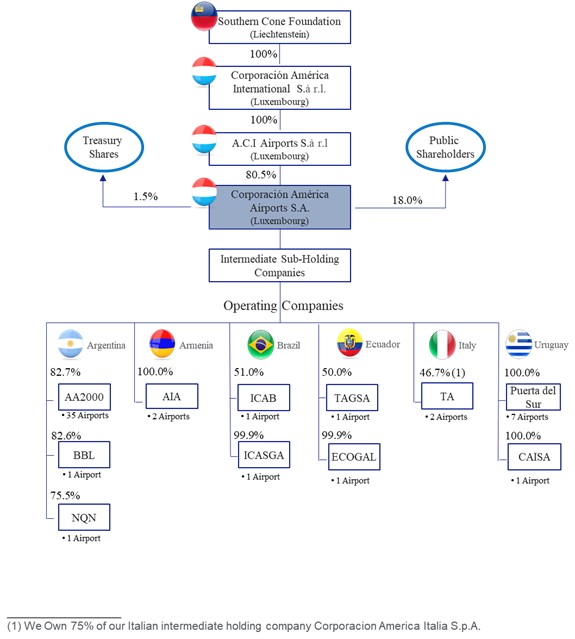The above geopolitical and trade uncertainty and tensions have resulted in fuel price increase has affected, and may continue to affect, our profitability. Sanctions, trade wars between certain countries or blocks of countries, or other governmental action related to tariffs or international trade agreements, could have a material adverse effect on passenger traffic on our airports as well as on our services, costs and suppliers or world economy or certain sectors thereof and, consequently, on our business and financial results.
We could be subject to acts of terrorism or war, which could have a negative impact on air travel and result in increased security requirements.
Our airports operate within a stringent and complex security regime, as required by the relevant governmental authorities, which may impose additional security measures from time to time, including as a result of a terrorist attack or a war act, such as the conflict between Russia and Ukraine. The consequences of the Russia and Ukraine conflict and any future terrorist action or threat may include the cancellation or delay of flights, fewer airlines and passengers using our airports, liability for damage or loss and the costs of repairing damage. If as a consequence of the Russia and Ukraine conflict or if a terrorist attack affected one of the airports we operate, the airport in question could be closed, in whole or in part, for the time needed to care for victims, investigate the circumstances of the attack, rebuild any damaged areas or otherwise, with a subsequent decrease in the revenue and increase in costs for the reconstruction of the affected areas (to the extent these are not covered by insurance policies).
Moreover, if an accident, act of terrorism or threat affects the safety standard perception on customers thereof or were to occur in a country in which we operate, even if not at our airports, the perception of safety by airport users could decrease, and, consequently, there could be a reduction in passenger air traffic for an indefinite period of time, which could adversely affect our business, financial condition, and results of operations.
Furthermore, the implementation of additional security measures at our airports in the future could lead to additional limitations on airport capacity or retail space, overcrowding, increases in operating costs and delays to passenger movement through the airport, any of which could have a material adverse effect on our business, financial condition, and results of operations.
Our business may also be affected by the outbreak of wars or armed conflicts in any region of the world. Among other things, wars can lead to increased prices of fuel, supplies, and interest rates for aircraft leases, which could, in turn, lead to increased prices of airline tickets and a decline in demand for air transportation in general. Likewise, the occurrence of armed conflicts could result in increased security measures, thereby increasing security costs.
We are dependent on information and communication technologies, and our systems and infrastructures face certain risks, including cybersecurity risks.
The operation of complex infrastructures, such as airports, and the coordination of the many actors involved in its operation require the use of several highly specialized information systems, including both our own information technology systems and those of third-party service providers, such as systems that monitor our operations or the status of our facilities, communication systems to inform the public, access control systems and closed circuit television security systems, infrastructure monitoring systems, passenger ticketing and boarding, automated baggage handling, points of sale, terminals and radio and voice communication systems used by our personnel. In addition, our accounting and fixed assets, payroll, budgeting, human resources, supplier and commercial, hiring, payments and billing systems and our websites are key to the functioning of our airports. The proper functioning of these systems is critical to our operations and business management. These systems may, from time to time, require modifications or improvements as a result of changes in technology, the growth of our business and the functioning of each of these systems.
In order to face these issues, we created a global information security department which reports to the Executive Committee. We also hired a global information security manager and reinforced the global information security department with multicultural security specialists in different locations. This new area focuses on contingency procedures, security governance, access and identity management, infrastructure protection and monitoring, researching and deploying new technology to improve protection of information and communication systems, However, these information technology systems cannot be completely protected against certain events such as natural disasters, fraud, computer viruses, hacking, communication failures, equipment breakdown, software errors and other technical problems. The occurrence of any of these events could disrupt our operations, resulting in increased costs, a decline in revenue and damage to our business in general, including, but not limited to harm to our public image.

